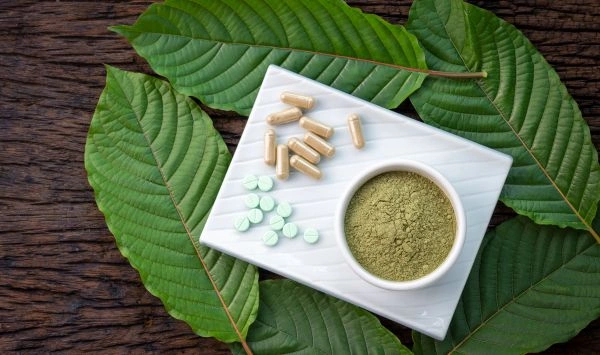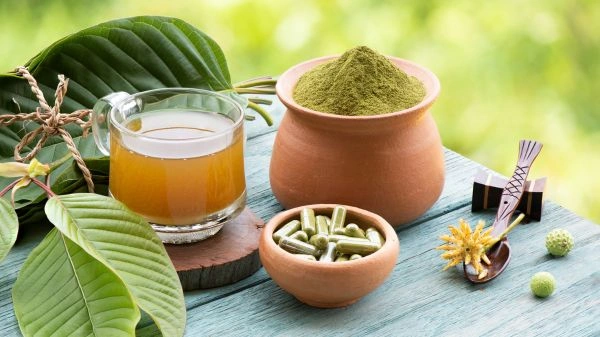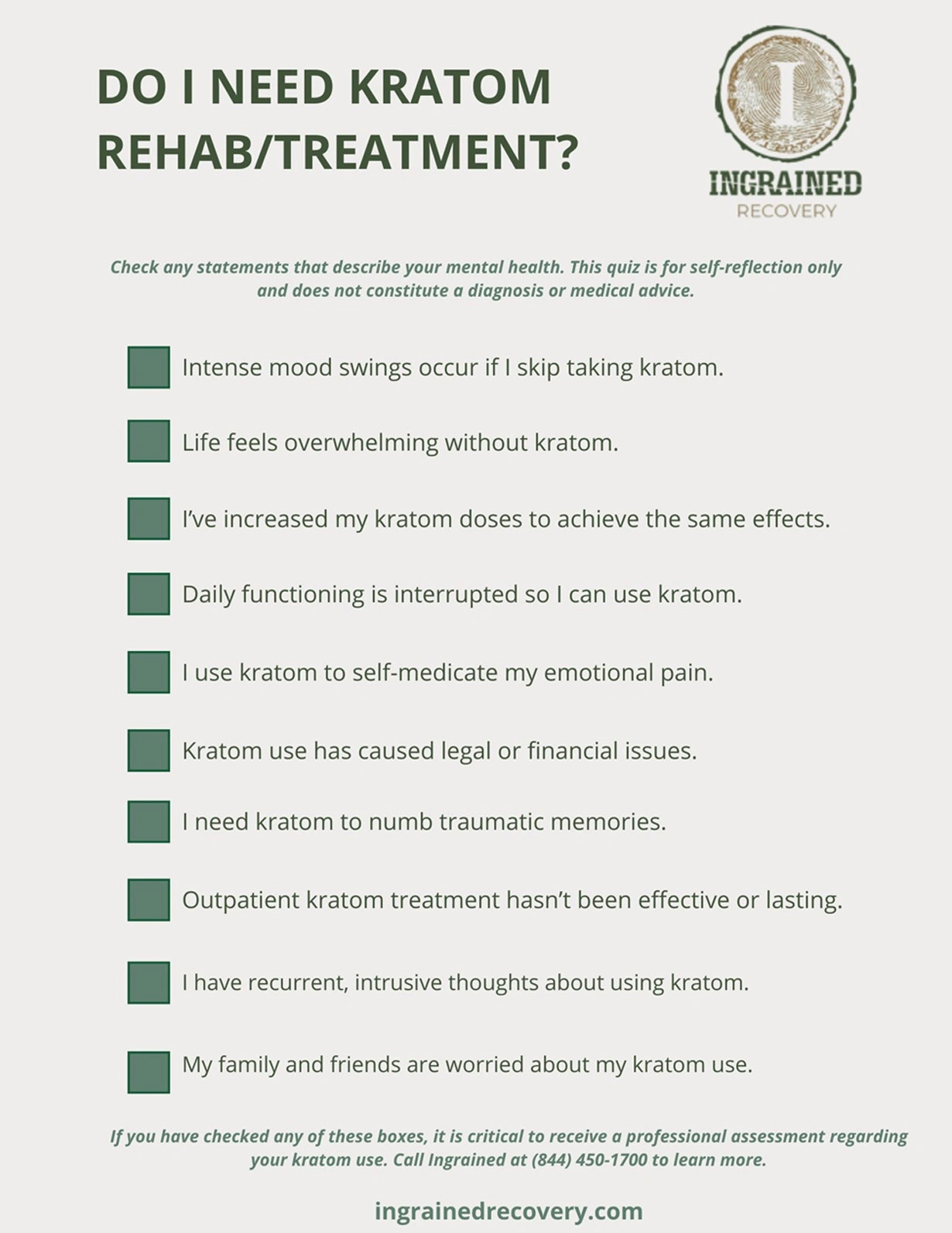Get Guidance and Information on Effective Kratom Rehab Programs
Kratom is a plant-based substance, misleading many to believe that it’s safe for pain relief. However, the effects of kratom are similar to opioids because the active compounds activate opioid receptors in the brain after use. Although not a controlled substance, a drug addiction to kratom is possible, similar to an opioid use disorder.
The Ingrained Recovery team knows that kratom rehab programs require the same level of attention as opioid addiction. Our primary goal is to keep each client safe as they face any underlying mental health conditions to achieve sobriety.
We invite you to read to learn more about the effects of kratom dependence and the most effective treatment options to break free of this increasingly common form of substance use disorder.
Kratom Is a Lesser-known Type of Substance Abuse
Deceptive marketing practices have contributed to kratom abuse. Is kratom addictive? Yes.
But it’s been downplayed and is unknown as an addictive substance because it’s readily available on shelves in herbal shops, convenience stores, and even gas stations.
Get Effective Treatment Programs at Ingrained Recovery

Federal Regulatory Failures and Kratom
Kratom has slipped between the regulatory cracks. When the Drug Enforcement Administration (DEA) attempted to classify kratom as a controlled substance in 2016, health supplement industry lobbyists launched strong opposition and stopped federal regulations.
Kratom also doesn’t fall in with other FDA-approved medications that require a strenuous process before hitting store shelves. The FDA has warned consumers about the risks of kratom use, including liver toxicity, seizures, and substance use disorder. They’ve even documented a few deaths.
They note that “Kratom is not appropriate for use as a dietary supplement” and have further stated that it should not be marketed as a dietary supplement or as a safe food additive. But that’s where their authority over kratom seems to end.
Get Proven Detox and Rehab Options at Ingrained

Some States Have Acted on Kratom
While the federal government has done little to educate and protect consumers, some states have stepped up to impose state laws. Georgia is one state that has taken such measures.
In 2024, the Peach State passed laws requiring the testing of kratom products by state-certified labs and implementing new label requirements. The legislation also banned the sale of kratom to anyone under 21 and required retail locations to keep these items behind a counter and accessible only to store employees. The new laws went into effect on January 1, 2025.
Treating these products on par with tobacco products and alcohol may signal to anyone purchasing them that there is a certain level of possible danger.
What Is Kratom?
Kratom comes from the leaves of Mitragyna speciosa, a tropical tree in Southeast Asia. For centuries, people in its native region have chewed these tree leaves to relieve pain or for a burst of energy.
Recently, kratom has become increasingly popular with Americans, who use it to self-medicate for pain, anxiety, and other mental health conditions. Some use it to reduce opioid withdrawal symptoms. Consumers can purchase kratom in capsules, powders, or teas.
Kratom Withdrawal Symptoms Mirror Opioid Withdrawal Symptoms
Stopping kratom can mean similar, but often less severe, withdrawal symptoms than other opioid drugs. This table compares and contrasts the initial symptoms:
| Symptom Category | Kratom Withdrawal Symptoms | Opioid Drug Withdrawal Symptoms |
| Physical Symptoms | Insomnia, muscle aches, jerky movements, runny nose, watery eyes, abdominal cramping, nausea, vomiting, diarrhea, dilated pupils, blurry vision, hot flashes, sweating, fever, decreased appetite, changes in heart rate and blood pressure, seizures | Goosebumps, restlessness, insomnia, watery eyes, yawning, runny nose, body aches, sweating, vomiting, abdominal cramping, nausea, fever, shaking, rapid breathing, fast heartbeat, high blood pressure, hallucinations, seizures |
| Psychological Symptoms | Irritability, insomnia, mood swings, anxiety, agitation, depression, cravings | Anxiety, lack of focus, depression, cravings, moodiness, feelings of hopelessness |
| Duration of Symptoms | The worst symptoms ease up after 7 to 10 days | The worst symptoms lighten up after 14 to 21 days |
| Severity | Usually milder than opioid withdrawal | More intense than kratom withdrawal symptoms |
Signs Someone Needs Substance Abuse Treatment for Kratom

The first step to seeking treatment is recognizing that a problem exists. One key sign of kratom abuse is chronic use, sometimes to the point of disrupting daily life. A person who needs the help of a treatment center to overcome addiction to any substance is neglecting school, work, or family responsibilities.
Those struggling with kratom or other drug abuse also have constantly increasing preoccupation with getting and using their drug of choice. It becomes a behavioral loop – the more they use, the more tolerance they build, so the more often (and increasing amounts) they use. While family members or friends may see this, the person struggling with kratom addiction cannot often see this cycle for themselves.
Those worsening conditions, along with mood swings, anxiety about substance use, or social withdrawal, can indicate that it’s time to seek kratom addiction treatment.
The Benefits of Choosing Ingrained for Kratom Abuse Support
Not all kratom addiction treatment centers are the same, and at Ingrained, we have set the gold standard. To our team, kratom rehab means a holistic, evidence-based treatment plan crafted for each individual.
Here are some of the benefits of attending our inpatient rehab or one of our partner outpatient treatment centers:
Treating Co-occurring Disorders Supports Your Lasting Recovery
Our mental and behavioral therapy center is staffed with licensed medical professionals with a strong knowledge of kratom and other substances. We understand that mental illness is often the cause of substance use disorders. We help each client overcome both mental health challenges by using therapy and medication management strategies that encompass both drug addiction treatment and care for mental disorders simultaneously. This comprehensive treatment approach is the key to unlocking long-term sobriety.
Imagine ‘Kendra,’ who started using kratom because it calmed her emotional pain after her husband passed away in a tragic accident. Her friends told her to pick it up at the herb shop, but she had no idea that non-FDA-approved medications could be sold. Weeks after she started, she tried to stop but had heart flutters as a result. She’d developed a substance use disorder that required treatment of both the trauma-related anxiety and the kratom to get her life back in order.
You'll Enjoy Luxury at Our Residential Treatment Center

We offer an inpatient therapy experience unlike any other in Georgia. Inpatient treatment at Ingrained includes a comfortable setting that feels more like home than a clinic. Client rooms and shared living spaces bring an air of tranquility. You’ll even participate in your treatment options in spaces that have been designed to put you at ease. Step out the doors of the residential treatment facility, and you’ll find yourself on a ranch where you can experience a unique offering – equine therapy sessions.
Referrals to Trusted Partners for Outpatient Rehab
We have partnered with top providers throughout the Peach State for those who prefer outpatient programs. This strategy ensures you receive support and ongoing treatment at a location that makes a partial hospitalization program or intensive outpatient treatment accessible near you.
A Kratom Detox Program in a Safe Medical Setting
Medically-assisted detox treatment methods are highly recommended for ending kratom addiction. As mentioned earlier, quitting kratom leads to potentially adverse effects that can threaten your safety. The way to stay well during the earliest days of kratom rehab? A medically supervised detox. The team at the medical detox center will monitor the first critical days of your recovery journey and offer you prescription medications to provide relief from the most intense kratom detox symptoms.
Meet ‘Rich,’ who tried a more potent form of kratom: 7-Oh Kratom on a golfing vacation with his buddies. He had been using it recreationally and found that it helped soothe his chronic headaches. Continued use after the vacation ended led to a kratom addiction.
Rich had tried to stop using it, but the kratom dependence caused severe withdrawal symptoms, including vomiting that caused dehydration. Rich sought a professional medical detox, where he received anti-nausea medication to get through the first couple of weeks of detoxing.
Customized Behavioral Therapy Makes a Meaningful Difference

At the close of medical detox, you’ll start therapy sessions. Our therapists use several strategies to ensure you have a great start toward a successful recovery.
- Individual Therapy Sessions: Our treatment programs rely heavily on individual therapy, where you work with an addiction treatment professional. The counselor will lead you in an exploration of the reasons behind your kratom addiction and then find the best strategies to move forward.
- Group Therapy: Peer groups work together to discuss the life experiences that brought them to kratom rehab and problem-solve to discover coping tools to break the cycle of drug abuse. They may use different strategies, including music, art therapy, or role-playing.
- Family Therapy: Family members can trigger kratom addiction, but they can also be your biggest support system after leaving treatment programs. The difference-maker is often family therapy, where a family counseling specialist works with opening up communications, healing old wounds, and setting boundaries.
Imagine ‘Trey,’ who tried to quit using kratom but couldn’t maintain sobriety no matter how hard he tried. He’d first tried it on the recommendation of the clerk at the local smoke shop, who assured him it was safe.
Only after his family doctor referred him to an addiction treatment center to stop the drug abuse did Trey fully understand that severity of his kratom abuse. After the medical detox, the treatment options he experienced helped him learn healthier ways to kick back and relax at the end of the day.
We Accept Many Insurance Plans to Make Kratom Rehab Affordable
We know that cost is a factor for many people looking for kratom rehab. We accept most major group health plans to make life-changing rehab services affordable. Even better, our admissions department has an insurance specialist who will contact your insurance provider to ensure you receive all other services you’re entitled to. We take the worry out of paying for rehab and let you get to the hard work of reclaiming your life after addiction.
Meet ‘Paola,’ who had good health insurance but little disposable income to pay for the behavioral therapy services necessary to quit using kratom. Paola learned that while insurance companies may technically cover mental health treatment plans, they do so somewhat grudgingly. Paola found that medical representatives can communicate best with insurance companies and can be a helpful advocate.
Up To 100% of Rehab Costs Covered By Insurance
Call Ingrained for a Holistic Kratom Treatment Program
Many people who need kratom detox and treatment have never heard about the dangers of the product until they have already used it. It sits on the shelves with pain relief products at convenience stores and gas stations. Perhaps you assumed that because the little packets of headache powder are pretty harmless, kratom must also be.
This is not the case, but there is a proven path to recovery offered at Ingrained.
If you’re ready to make life changes and end kratom dependence today, call us. We’re here to support you.
